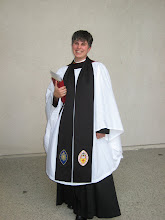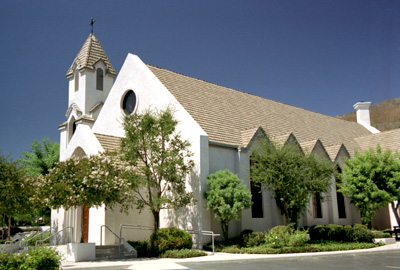While we are most familiar with St. Francis' love for animals (thus the Blessing of the Animals coming up on October 5, one day after the Feast Day of St. Francis where the church remembers and celebrates his life), St. Francis also took care of the outcast of his time - the poor and the lepers. There is a story of St. Francis kissing a leper he encounters during his travels. Click here to read more. Below is the editorial I mentioned in my sermon last Sunday. It was written by the Rev. Dr. Tim Vivian and published in the early 1990's in the Californian, Bakersfield's local paper.
Kissing the Leper
Last Friday I sat with the lepers and outcasts. Inside St. Paul's Episcopal parish, delegates for diocesan convention were meeting, but we were outside because Bishop Schofield refused to allow us inside. Who were we? Members of Integrity, the national organization supporting gays and lesbians in the Episcopal Church. Bishop Schofield not only refused us entrance to St. Paul's, he has refused to allow Integrity to meet in any parish in the diocese; he has forbidden the clergy of the diocese to celebrate Communion for the people of Integrity.
I wish this fear and hatred of gays by many Christians were an isolated event, a simple example of theological racism, but it isn't. Among some Christians, homophobia is just one symptom; others are fear of women, fear of sexuality, fear of the poor, fear of those not like us, and fear of change.
The reasons for these fears--and the hatred that often accompanies them--are complex, but they are bound together by, and find their common expression in, a profound misunderstanding and misuse of the Bible
With regard to homosexuality, the extreme conservative argument is simple: Homosexuality is evil, a sin, because the Bible says so. Such an argument reduces a complicated human subject to absolutes of good and evil, right or wrong. Those who make this argument conveniently--or blindly--ignore the fact that "the Bible" variously endorses polygyny, slavery, massacre, and the sequestration of women during their periods.
Put more positively, the Bible is a human document (or collection of documents), a human witness to God's being, activity, and presence. As a human witness, it is a fallible one. Since the Bible is a human witness, those who wrote it--however inspired they were--were subject to social, political, ethnic, temporal and religious biases and prejudices, just as we are today.
In ignoring all this, conservative biblicists make a serious mistake; unfortunately, in their use of the Bible they commit a worse one: false use is worse than false understanding. Biblicists mistakenly believe that the Bible is a book of dictates and rules, revealed by God. Once they have this infallible rule book in hand, like a boy scout with his handbook, they selectively decide which issues are most important. Usually for biblicists it is homosexuality or sexuality in general, abortion, and women's subordination. Biblicists are so obsessed with these issues that they usually ignore questions of social justice, poverty, homelessness, or war and peace.
It is a question of priorities, and biblicists have their priorities wrong. While more and more of our people go hungry and homeless, die from drugs and violence, and live lives without meaning, biblicists care more about who is sleeping with whom and what parts of the body are being used to do what.
Those who condemn homosexuality say they are speaking of "biblical" ethics or as a "biblical" Church. But what is this "biblical" belief as it seems to be practiced in this country?
Is it "biblical" to condemn homosexuality while at the same time keeping a patriotic and blasphemous silence (as virtually all of the churches of Kern County did) when the United States slaughtered over 100,000 Iraqis?
Is it "biblical" to oppose abortion while supporting or keeping silent about the death penalty (legalized State murder)?
Is it "biblical" to deny, in the name of scripture and tradition, the full ministry of women in the Church--as the local Episcopal Church does?
No. None of these is biblical. Some who espouse certain "biblical beliefs" are misguided: they naively and simplistically use the Bible to support non-Biblical agendas.
Others, though, who make "biblical" statements--such as certain bishops, priests, and ministers--should by their training know better. Their use of "the Bible" is at best a form of fundamentalism; at worst, it is knowingly mendacious. Such biblicism is not Christian.
Those of us who are not biblicists or fundamentalists, as we listen to their increasingly strident voices, need to remember that--despite their loud shouts--they do not represent the truth of Christianity. Their misuse of the Bible in no way damages its real message: that God is a God of love and compassion, mercy and tenderness; that God became human in order to fully know our humanity; that God loves each of us equally and completely.
The Bible--the true Bible--not only calls us to kiss, like St. Francis, the mouth of the leper. It calls us to claim the leper's mouth as our own.
Dr. Tim Vivian
Assistant Professor of Religious Studies
Department of Philosophy & Religious Studies
California State University Bakersfield


3 comments:
If the Bible is not the word of God, then is the New York Times equivalent to it? If the Bible is not the word of God, do we all just go with our feelings and call it the work of the Spirit? Are the 10 commandments not the word of God? Such freedom.
This is a great question! There is a lot of tension within the Christian church on exactly this topic: the Word of God. First, let me say that I don't believe Tim is saying that the Bible is not the Word of God, or that it is the equivalent of the NYT or that the 10 commandments aren't God's Word. I believe what Tim is saying is that the Bible, the Word of God, comes to us via human hands, hearts and minds. It reminds me of that saying by St. Teresa of Avila, "Christ has no body now on earth but yours." The Bible is a record of God's action in history, who we have known God to be during a particular place in time (in the case of the Bible, it is the story of ancient Israel, Jesus in the first century, and the early church). The Bible is alive now because we find in its passages timeless wisdom, pointing towards the God who created us, loves us, and is in relationship with us. Indeed, there is such freedom! Not freedom in the sense of carelessness, but freedom in the sense of deep engagement with these ancient texts, which through prayerful study and discernment, still have the power to transform lives and bring into sharper contrast the action of God in our time and place!
The Bible does require prayerful study and discernment. We must "read, mark, learn, and inwardly digest" as we pray in our Collect for proper 28. In fact, the whole Bible itself is a commentary on itself. We have one prophet who tells Israel to beat swords into plowshares and another who tells Israel to beat plowshares into swords. Which is right? We have all the laws from the Leviticus that, taken on face value, black and white text lifted from the page, makes little sense to us in this place in time (I will spare you the many examples). However, Leviticus and the Bible in its entirety is a love story of covenant between God and God's people. It is absolutely the Word of God!
The Bible is a rich, fluid, alive, holy text. However, I will always argue that the Bible does require interpretation. It is how we can most deeply engage with it and allow the God of those pages to transform our lives. I also believe that a lack of interpretation is dangerous. We can simply take a look at history and see what has happened in the name of God to see how necessary it is to prayerfully discern in community of other faithful the meaning of God's Word. But that in itself is far from burdensome, but rather it is one of the great joys of being a Christian!
Lastly, I want to add, that this tradition of interpretation is entirely Anglican. Via Media all the way!
On this topic I recommend Donn Morgan's book, Fighting With the Bible: Why Scripture Divides Us and How It Can Bring Us Together. It's a great read and deals very intelligently and fairly with exactly this tension, these questions, that are so present in the Christian church today.
quite interesting post. I would love to follow you on twitter.
Post a Comment